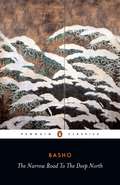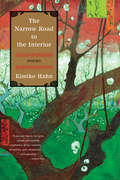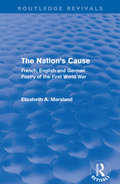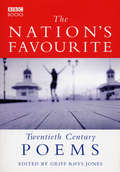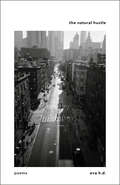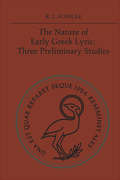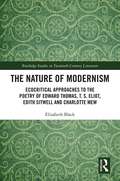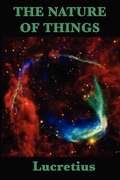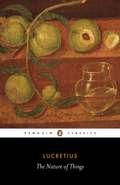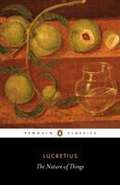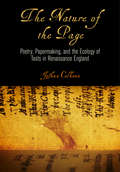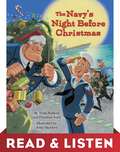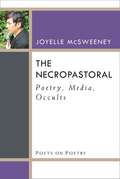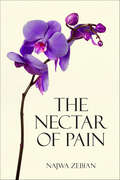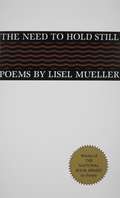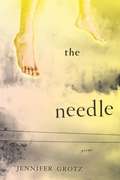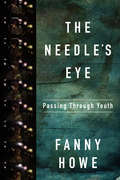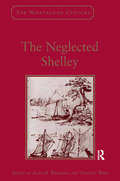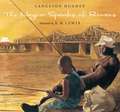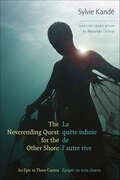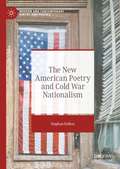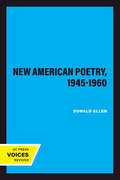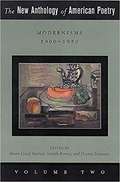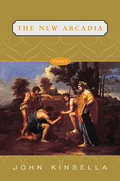- Table View
- List View
The Narrow Road to the Deep North and Other Travel Sketches
by Matsuo Basho'It was with aweThat I beheldFresh leaves, green leaves,Bright in the sun'When the Japanese haiku master Basho composed The Narrow Road to the Deep North, he was an ardent student of Zen Buddhism, setting off on a series of travels designed to strip away the trappings of the material world and bring spiritual enlightenment. He writes of the seasons changing, the smell of the rain, the brightness of the moon and the beauty of the waterfall, through which he sensed the mysteries of the universe. These writings not only chronicle Basho's travels, but they also capture his vision of eternity in the transient world around him.Translated with an Introduction by Nobuyuki Yuasa
The Narrow Road to the Interior: Poems
by Kimiko HahnAn expansive work inspired by Japanese prose-poetry from a poet of "rigorous intelligence, fierce anger, and deep vulnerability" (Mark Doty). Kimiko Hahn, "a welcome voice of experimentation and passion" (Bloomsbury Review), takes up the Japanese prose-poetry genre zuihitsu--literally "running brush," which utilizes tactics such as juxtaposition, contradiction, and broad topical variety--in exploring her various identities as mother and lover, wife and poet, daughter of varied traditions.
The Nation's Cause: French, English and German Poetry of the First World War (Routledge Revivals)
by Elizabeth A. MarslandAs we approach the centenary of the outbreak of the First World War, this timely reissue, first published in 1991, evaluates the function of poetry in wartime Europe, arguing that war poetry must be understood as a social as well as a literary phenomenon. As well as locating the work of well-known French, English and German war poets in a European context, Elizabeth Marsland discusses lesser-known poetry of the war years, including poems by women and the neglected tradition of civilian protest through poetry. Identifying shared characteristics as well as the unique features of each nation’s poetry, The Nation’s Cause affords new insight into the relationship between nationalism and the social attitudes that determined the conduct of war.
The Nation's Favourite: Twentieth Century Poems
by Griff Rhys JonesThis lovely book of poetry brings together over 100 of the most celebrated and cherished poems of the 20th century. Including poets as diverse as John Betjeman and Ted Hughes, Siegfried Sassoon and Allan Ahlberg, and subjects from all avenues of life - war, family life, love, death, religion, the countryside, animals and comedy - the whole breadth of the nation's life during the 20th century is encapsulated here. Compiled and edited by Griff Rhys Jones as part of the successful The Nations Favourite Poems series, this book brings together the wealth of new and innovative poetry styles that flourished in the 20th Century.
The Natural Hustle: Poems
by Eva H.D.An astonishing, inventive new collection of poems from the author of Rotten Perfect Mouth.Includes the poem &“Bonedog&” featured in the film I&’m Thinking of Ending ThingsDeeply attuned to the cadence of life, the poems in The Natural Hustle offer provocative, intimate snapshots. They explore the bewildering experience of living—precisely locating unexpected truths. Ingenious, original, surprising, here is a one-of-a-kind poetic voice.
The Nature of Early Greek Lyric: Three Preliminary Studies
by Robert L. FowlerThree important literary questions in early Greek lyrics are addressed in this study. First, Fowler attempts to determine the extent that Homer and epic poetry generally influenced the lyric poets, with respect to both the style of compositions and their content. Identifying the certain examples of influence – which are far fewer than often thought – he analyses the technique of imitation, tracing a development from simpler to more complex as the archaic period proceeds. Throughout this and the following chapter, he often finds occasion to take issue with the famous and influential view of the early Greek mind championed by Bruno Snell and Hermann Fränkel. In the second chapter Fowler studies the organization of individual poems, identifying compositional principles that may be used to solve literary and textual problems. Some of these principles, like ring-composition, are old familiars; others are not. All are found to be more pervasive than is often realized, and reflect an attitude to composition rather different from the disorderly and associative techniques traditionally ascribed to the lyrics poets. The last chapter explores the nature of genres in the archaic period, starting from the vexed question of the definition of elegy. In all the genres associated with particular occasions, the author finds that the poets' professional skills and self-consciousness became more important than the purely occasional aspects of their composition. Observations of interest are made on, among others, citharodic songs, epigrams and epinician odes; and elegy in the end turns out, paradoxically, not to be a true genre at all.
The Nature of Modernism: Ecocritical Approaches to the Poetry of Edward Thomas, T. S. Eliot, Edith Sitwell and Charlotte Mew (Routledge Studies in Twentieth-Century Literature)
by Elizabeth BlackThis books presents the first extended study of the relationship between British modernist poetry and the environment. Challenging reductive associations of modernism as predominantly anthropocentric in character and urban in focus, the book’s central argument is that within British modernist poetry there is a clear and sustained interest in the natural world which has yet to receive adequate critical attention. Whilst modernist studies continues to emphasize the plurality of the movement and the breadth of voices and concerns within it, the environmental consciousness of modernist literature and its response to changes to human/nature relations following the experience of war and modernity remain largely unexamined. Exploring British modernist poetry from an ecocritical perspective offers a fresh approach to the movement and its context, and produces original readings of both canonical and more marginalized modernist voices. This book opens by discussing the relationship between modernism and ecocriticism and the benefits of creating a dialogue between the two. It then presents new readings of Edward Thomas, T. S. Eliot, Edith Sitwell, and Charlotte Mew that reveal a shared preoccupation with environmental issues and a common desire to find new ways of achieving physical, psychological, and artistic reconnection with nature. Building on the continuing growth of ecocriticism, this book demonstrates how green approaches to modernist studies can produce new insights into both individual poets and the modernist movement as a whole, making it an essential resource for students of modernism, ecocriticism, and early-twentieth-century literature.
The Nature of Things
by LucretiusDe rerum natura (On the Nature of Things) is a 1st century BC didactic poem by the Roman poet and philosopher Lucretius with the goal of explaining Epicurean philosophy to a Roman audience. Lucretius presents the principles of atomism; the nature of the mind and soul; explanations of sensation and thought; the development of the world and its phenomena; and explains a variety of celestial and terrestrial phenomena. The universe described in the poem operates according to these physical principles, guided by fortuna, "chance," and not the divine intervention of the traditional Roman deities.
The Nature of Things
by LucretiusLucretius' poem On the Nature of Things combines a scientific and philosophical treatise with some of the greatest poetry ever written. With intense moral fervour he demonstrates to humanity that in death there is nothing to fear since the soul is mortal, and the world and everything in it is governed by the mechanical laws of nature and not by gods; and that by believing this men can live in peace of mind and happiness. He bases this on the atomic theory expounded by the Greek philosopher Epicurus, and continues with an examination of sensation, sex, cosmology, meteorology, and geology, all of these subjects made more attractive by the poetry with which he illustrates them.
The Nature of Things
by Stallings LucretiusLucretius' poem On the Nature of Things combines a scientific and philosophical treatise with some of the greatest poetry ever written. With intense moral fervour he demonstrates to humanity that in death there is nothing to fear since the soul is mortal, and the world and everything in it is governed by the mechanical laws of nature and not by gods; and that by believing this men can live in peace of mind and happiness. He bases this on the atomic theory expounded by the Greek philosopher Epicurus, and continues with an examination of sensation, sex, cosmology, meteorology, and geology, all of these subjects made more attractive by the poetry with which he illustrates them.
The Nature of the Page: Poetry, Papermaking, and the Ecology of Texts in Renaissance England (Material Texts)
by Joshua CalhounIn The Nature of the Page, Joshua Calhoun tells the story of handmade paper in Renaissance England and beyond. For most of the history of printing, paper was made primarily from recycled rags, so this is a story about using old clothes to tell new stories, about plants used to make clothes, and about plants that frustrated papermakers' best attempts to replace scarce natural resources with abundant ones. Because plants, like humans, are susceptible to the ravages of time, it is also a story of corruption and the hope that we can preserve the things we love from decay.Combining environmental and bibliographical research with deft literary analysis, Calhoun reveals how much we have left to discover in familiar texts. He describes the transformation of plant material into a sheet of paper, details how ecological availability or scarcity influenced literary output in the sixteenth and seventeenth centuries, and examines the impact of the various colors and qualities of paper on early modern reading practices. Through a discussion of sizing—the mixture used to coat the surface of paper so that ink would not blot into its fibers—he reveals a surprising textual interaction between animals and readers. He shows how we might read an indistinct stain on the page of an early modern book to better understand the mixed media surfaces on which readers, writers, and printers recorded and revised history. Lastly, Calhoun considers how early modern writers imagined paper decay and how modern scholars grapple with biodeterioration today.Exploring the poetic interplay between human ideas and the plant, animal, and mineral forms through which they are mediated, The Nature of the Page prompts readers to reconsider the role of the natural world in everything from old books to new smartphones.
The Navy's Night Before Christmas: Read & Listen Edition
by Christine Ford Trish HollandThis story, written for military families, is about a visit from &“the Santa of Sailors&” to those who can&’t be home for Christmas. &’Twas the night before Christmas, when way out to sea Not a creature was stirring to windward or lee. The sailors were nestled all snug in their racks Like orders of pancakes, so tight were the stacks. One Christmas Eve out at sea, some homesick sailors are paid a visit by Master Chief Claus, the Santa of Sailors. This lively and poignant tale was inspired by Clement C. Moore&’s classic yuletide poem.This Read & Listen edition contains audio narration.
The Necropastoral: Poetry, Media, Occults
by Joyelle McsweeneyIn The Necropastoral: Poetry, Media, Occults, poet Joyelle McSweeney presents an ecopoetics and a theory of Art that reflect such biological principles as degradation, proliferation, contamination, and decay. In these ambitious, bustling essays, McSweeney resituates poetry as a medium amid media; hosts "strange meetings" of authors, texts, and artworks across the boundaries of genre, period, and nation; and examines such epiphenomena as translation, anachronism, and violence. Through readings of artists as diverse as Wilfred Owen, Andy Warhol, Harryette Mullen, Roberto Bolaño, Aimé Césaire, and Georges Bataille, The Necropastoral shows by what strategies Art persists amid lethal conditions as a spectacular, uncanny force.
The Nectar of Pain
by Najwa ZebianIn The Nectar of Pain, Zebian sheds light on the feelings and experiences that emerge from a painful heartbreak. She writes that the process of cleansing oneself of that pain—day by day, hour by hour, and second by second—is the real work of healing.With uncommon warmth and wisdom, Zebian empowers all who have lost to let go of anger and transform their suffering into the softness, sweetness, and beauty of nectar. She holds her readers by the hand as they heal.
The Need To Hold Still: Poems
by Lisel MuellerWinner of the National Book Award for Poetry in 1981.
The Needle
by Jennifer GrotzFollowing her debut collection, Cusp, chosen by Yusef Komunyakaa to win the Bread Loaf Writers' Conference Bakeless Prize, the composed, observed quality of Jennifer Grotz's The Needle will remind readers of the poetry of Elizabeth Bishop and Ellen Bryant Voigt. Whether she is describing a town square in Kraków, where many of these poems are set, the ponies of Ocracoke Island, a boy playing a violin, or clouds, she finds the lyrical details that release an atmosphere of heightened, transcendent attention in which the things of the world become the World, what Zbigniew Herbert called "royal silence."
The Needle's Eye: Passing through Youth
by Fanny HoweA meditation on time, violence, and chance by "one of America's most dazzling poets" (O, The Oprah Magazine)Fanny Howe's The Needle's Eye: Passing through Youth is a sequence of essays, short tales, and lyrics that are intertwined by an inner visual logic. The book contains filmic images that subvert the usual narrative chronology; it is focused on the theme of youth, doomed or saved. A fourteenth-century folktale of two boys who set out to find happiness, the story of Francis and Clare with their revolutionary visions, the Tsarnaev brothers of Boston, the poet George Oppen and the philosopher Simone Weil, two strangers who loved but remain strange, and the wild-child Brigid of Ireland: all these emerge "from multiple directions, but always finally from the eye at the end." As the philosopher Richard Kearney writes, "Howe's ruminations and aesthetics are those of the fragmentary, but are unified by world thinkers like Arendt, Weil, Agamben, and Yeats." The Needle's Eye is a brilliant and deeply felt exploration of faith and terror, coincidence and perception, by a literary artist of profound moral intelligence, "recognized as one of the country's least compromising yet most readable experimentalist writers" (The Boston Globe).
The Neglected Shelley (The Nineteenth Century Series)
by Timothy Webb Alan M. WeinbergNew editions and facsimiles of Percy Bysshe Shelley's works are changing the landscape of Shelley studies by making complete compositions and fragments that have received only limited critical attention readily available to scholars. Building on the work begun in Weinberg and Webb's 2009 volume, The Unfamiliar Shelley, The Neglected Shelley sheds light on the breadth and depth of Shelley's oeuvre, including the poet's earliest work, written when he was not yet twenty and was experimenting with gothic romances, and other striking forms of literary expression, such as two collections of provocative verse. There are discussions of Shelley's collaboration with Mary Shelley in the composition of Frankenstein, and his skill as a translator of Greek poetry and drama, reflecting his urgent concern with Greek culture. His contributions to prose are the focus of essays on his letters, the subversive notes to Queen Mab, and his complex engagement with Jewish culture. Shelley's considerable corpus of fragments is well-represented in contributions on the later narrative fiction, 'Athanase'/'Prince Athanase', and the significant group of unfinished poems, including 'Mazenghi', 'Fiordispina', 'Ginevra' and 'The Boat on the Serchio', that treat Italian topics. Finally, there are explorations of subtle though neglected or underestimated works such as Rosalind and Helen, The Sensitive-Plant, and the verse-drama Hellas. The Neglected Shelley shows that even the poet's apparently slighter works are important in their own right and are richly instructive as expressions of Shelley's developing art of composition and the diverse interests he pursued throughout his career.
The Negro Speaks of Rivers
by Langston HughesHughes has long been acknowledged as the voice of the Harlem Renaissance, and this poem is considered the movement's song. Artist Lewis acts as interpreter and visionary, using watercolor to pay tribute to Hughes's timeless anthem, a poem that every child deserves to know.
The Neverending Quest for the Other Shore: An Epic in Three Cantos (Wesleyan Poetry Series)
by Sylvie KandéSylvie Kandé's neo-epic in three cantos is a double narrative combining today's tales of African migration to Europe on the one hand, with the legend of Abubakar II on the other: Abubakar, emperor of 14th-Century Mali, sailed West toward the new world, never to return. Kandé's language deftly weaves a dialogue between these two narratives and between the epic traditions of the globe. Dazzling in its scope, the poem swings between epic stylization, griot storytelling, and colloquial banter, capturing an astonishing range of human experience. Kandé makes of the migrant a new hero, a future hero whose destiny has not yet taken shape, whose stories are still waiting to be told in their fullness and grandeur: the neverending quest has only just begun. Country folk who made themselves belated marinerstheir bodies cadence themto cleave with the oar's tainted tipthe purple mounds of the great salt savannahwhich no furrow markswhere no seed takes root (But to say the seaearthly words are little suited)At the point of the dreamthey were a myriadno less and no moreto cross the coral barrier in laughter with its vermilion flowers:there remain but three barks adriftfull so full to the point of capsizing
The New American Poetry and Cold War Nationalism (Modern and Contemporary Poetry and Poetics)
by Stephan DelbosThis book examines Donald M. Allen’s crucially influential poetry anthology The New American Poetry, 1945–1960 from the perspectives of American Cold War nationalism and literary transnationalism, considering how the anthology expresses and challenges Cold War norms, claiming post-war Anglophone poetic innovation for the United States and reflecting the conservative American society of the 1950s. Examining the crossroads of politics, social life, and literature during the Cold War, this book puts Allen’s anthology into its historical context and reveals how the editor was influenced by the volatile climate of nationalism and politics that pervaded every aspect of American life during the Cold War. Reconsidering the dramatic influence that Allen’s anthology has had on the way we think about and anthologize American poetry, and recontextualizing The New American Poetry as a document of the Cold War, this study not only helps us come to a more accurate understanding of how the anthology came into being, but also encourages new ways of thinking about all of Anglophone poetry, from the twentieth century and today.
The New American Poetry, 1945-1960
by Donald AllenWith more than 100,000 copies sold, The New American Poetry has become one of the most influential anthologies published in the United States since World War II. As one of the first counter-cultural collections of American verse, this volume fits in Robert Lowell's famous definition of the raw in American poetry. Many of the contributors once derided in the mainstream press of the period are now part of the postmodern canon: Olson, Duncan, Creeley, Guest, Ashbery, Ginsberg, Kerouac, Levertov, O'Hara, Snyder, Schuyler, and others. Donald Allen's The New American Poetry delivered the first taste of these remarkable poets, and the book has since become an invaluable historical and cultural record, now available again for a new generation of readers.
The New Anthology of American Poetry, Volume Two: Modernisms: 1900-1950
by Thomas Travisano Steven Axelrod Camille RomanBringing together fifty years of exciting modernisms, The New Anthology of American Poetry, Volume 2 includes over 600 poems by sixty-five American poets writing in the period between 1900 and 1950. The most recognized poets of the era, such as William Carlos Williams, Ezra Pound, Wallace Stevens, T. S. Eliot, H. D., Gertrude Stein, Robert Frost, Marianne Moore, Hart Crane, and Langston Hughes are represented, along with many other Harlem Renaissance poets, women poets, immigrant and working-class poets, imagists, and objectivists. It is also the first modernist anthology to include poems and songs from popular culture.
The New Arcadia: Poems
by John KinsellaOne of Australia's best poets conjures the Australian countryside in this brilliant epic, inspired by Philip Sidney's classic pastoral "Arcadia." "Astonishingly fecund and inventive. The New Arcadia revitalizes pastoral traditions, but more in the mode of lamentation than celebration. Like Frost's New Hampshire and Vermont, Kinsella's Western Australia is eroded, a last act salted with the ruins of our age, and yet yielding permanent poems."--Harold Bloom
